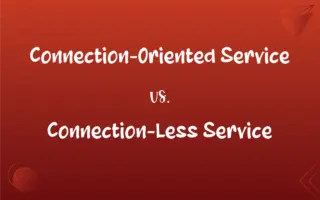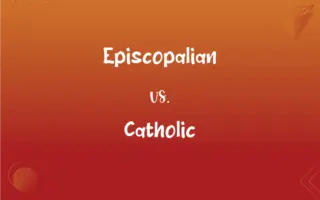Is vs. Are: What's the Difference?
Edited by Aimie Carlson || By Janet White || Published on February 28, 2024
"Is" is used with singular subjects, while "are" is used with plural subjects.

Key Differences
Is and are are both forms of the verb "to be," used in different grammatical contexts. Is is singular, for a single subject, while are is plural, for multiple subjects. For instance, "The cat is sleeping" versus "The cats are sleeping."
In terms of usage, is often denotes a state or condition for a singular noun or pronoun, as in "He is happy." Conversely, are is used similarly but for plural nouns or pronouns, like in "They are excited."
The choice between is and are can also indicate the number of a subject; is for singular (one), and are for plural (more than one). For example, "This is a book" versus "These are books."
In questions, is and are take the beginning position but still follow the singular/plural rule. "Is it ready?" versus "Are they ready?"
In contractions, is and are change form. Is becomes 's as in "She's here," while are becomes 're as in "They're here."
ADVERTISEMENT
Comparison Chart
Subject Agreement
Matches with singular subjects.
Matches with plural subjects.
Example Nouns
Cat, book, apple.
Cats, books, apples.
Example Pronouns
He, she, it.
They, we.
In Questions
"Is this yours?"
"Are these yours?"
Contractions
She's, he's.
They're, we're.
ADVERTISEMENT
Use in Present Tense
Describes current state for one.
Describes current state for many.
Is and Are Definitions
Is
Indicates existence or a state for a singular subject.
The sky is blue.
Are
Indicates existence or a state for plural subjects.
The flowers are beautiful.
Is
Serves as a linking verb to a complement.
He is a teacher.
Are
Expresses a location for multiple items or people.
The keys are on the counter.
Is
Describes a singular subject's current action.
She is singing.
Are
Acts as a linking verb to a complement in plural.
They are engineers.
Is
Expresses a location for one item or person.
The book is on the table.
Are
Describes plural subjects' current actions.
The birds are flying.
Is
Indicates time or date in singular terms.
It is 5 o'clock.
Are
Indicates time or date in a general sense.
Are the holidays soon?
Is
Third person singular present indicative of be.
Are
Second person singular and plural and first and third person plural present indicative of be.
Is
Used in phrases with existential there when the semantic subject is a third-person plural.
There is three of them there.
Is
(Geordie) me.
Is
(rare) i's.
Is
The third person singular of the substantive verb be, in the indicative mood, present tense; as, he is; he is a man. See Be.
For thy is I come, and eke Alain.
Aye is thou merry.
To-morrow is the new moon.
FAQs
When do I use "is"?
Use "is" with singular nouns and pronouns (he, she, it).
Can "is" be used for plural subjects?
No, "is" is only for singular subjects.
What are some examples of "is" in sentences?
"The car is new," "She is a doctor."
Can I use "is" with uncountable nouns?
Yes, like "Water is essential."
Can you give examples of "are" in sentences?
"The flowers are blooming," "They are students."
How is a question formed with "are"?
Begin with "are": "Are they coming?"
When should I use "are"?
Use "are" with plural nouns and pronouns (they, we).
Can "are" describe temporary states?
Yes, e.g., "They are being noisy."
How do I form a question with "is"?
Place "is" at the beginning: "Is this your book?"
Is "are" ever used with singular nouns?
No, "are" is specifically for plural nouns.
How does context affect the use of "is" and "are"?
The number of the subject (singular or plural) dictates the use.
Can "are" be used with collective nouns?
Yes, if the collective noun is considered plural.
What's the contraction form of "is"?
"Is" becomes 's, as in "She's here."
Can "is" and "are" be omitted in informal speech?
Sometimes, especially in casual or informal contexts.
What's the contraction for "are"?
"Are" becomes 're, like in "They're here."
What is the past tense of "are"?
"Were" is the past tense form of "are."
Are there exceptions to these rules?
English has exceptions, but these rules generally hold.
Can "is" and "are" indicate possession?
No, they indicate states or existence, not possession.
Can "is" describe a permanent state?
Yes, like "He is tall."
Is "is" used in past tense?
No, "was" is used for past tense singular.
About Author
Written by
Janet WhiteJanet White has been an esteemed writer and blogger for Difference Wiki. Holding a Master's degree in Science and Medical Journalism from the prestigious Boston University, she has consistently demonstrated her expertise and passion for her field. When she's not immersed in her work, Janet relishes her time exercising, delving into a good book, and cherishing moments with friends and family.
Edited by
Aimie CarlsonAimie Carlson, holding a master's degree in English literature, is a fervent English language enthusiast. She lends her writing talents to Difference Wiki, a prominent website that specializes in comparisons, offering readers insightful analyses that both captivate and inform.






































































